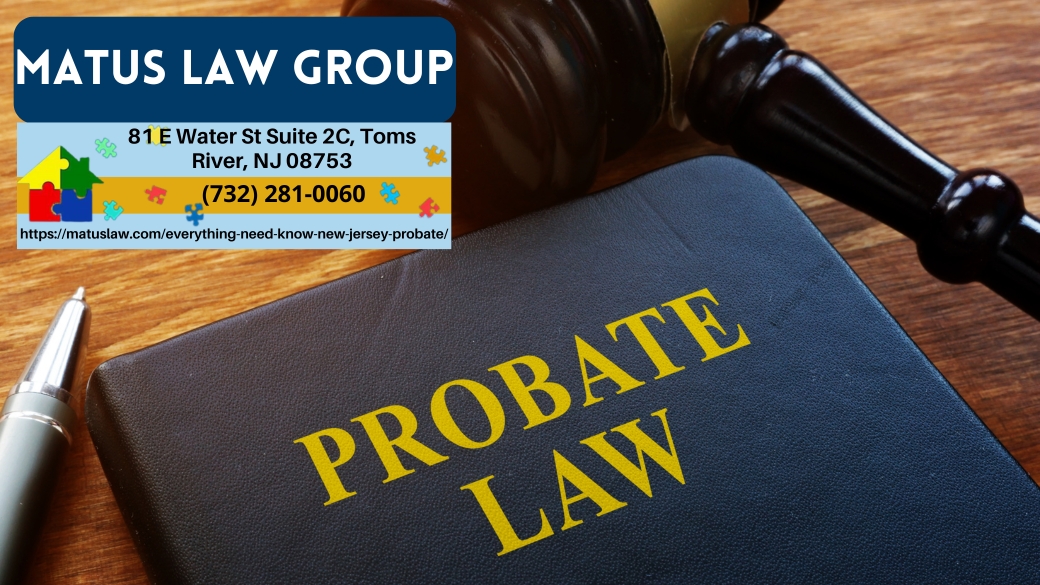New Jersey probate lawyer Christine Matus (https://matuslaw.com/everything-need-know-new-jersey-probate/) of The Matus Law Group provides critical insights into the often complicated probate process in New Jersey, helping individuals handle their loved ones’ estates appropriately. As a seasoned New Jersey probate lawyer, Christine Matus explains the steps and intricacies involved in the probate process and how it impacts those left behind.
The probate process in New Jersey, as outlined by Christine Matus, begins shortly after the passing of an individual. It requires careful attention to details such as validating a will, identifying assets, paying debts, and distributing property according to the deceased’s wishes. As a New Jersey probate lawyer, Matus emphasizes the importance of understanding this legal procedure, stating that “planning your estate is an effective way to help ensure that your property is safe and passed on to the people who you want to receive it.”
The New Jersey probate process can be challenging due to its legal complexity. Christine Matus, as a New Jersey probate lawyer, highlights the key steps involved, such as filing the appropriate paperwork, validating the will, and addressing any debts and taxes. Matus further explains that probate should be initiated no earlier than eleven days after the individual’s death, with the executor or appointed administrator handling crucial aspects such as filing the Application for Probate at the Surrogate’s Court in the county where the deceased resided.
Christine Matus, who serves as a trusted New Jersey probate lawyer, notes that probate can become particularly intricate when there is no valid will. In such cases, New Jersey’s laws of intestate succession dictate how the estate will be distributed among surviving relatives. Matus explains, “If the decedent had children but no spouse, the children would automatically inherit their parent’s property,” emphasizing the importance of creating a will to prevent unexpected outcomes. When no executor is named or available, the court appoints an administrator to handle the estate according to state law.
As the probate process progresses, Christine Matus advises that the executor of the will must manage the assets, including appraisals and the potential sale of property to cover outstanding debts or taxes. Under Ronnie’s Law, if a beneficiary has a developmental disability, the executor is required to post a bond unless exempted. Matus points out that while probate can last up to a year, the role of the executor is essential in settling debts and appropriately distributing assets among the heirs.
One of the common concerns addressed by Christine Matus, as a New Jersey probate lawyer, is whether all wills must go through probate. Matus clarifies that probate is required for assets solely owned by the deceased but may be avoided in some cases, such as when assets are jointly owned or when designated to pass directly to a beneficiary. For example, life insurance policies and retirement accounts typically bypass the probate process. However, probate remains necessary for assets such as real estate and bank accounts held in the deceased’s name alone.
In some instances, probate can be avoided altogether, especially for small estates. According to Christine Matus, the surviving spouse may file an appeal to avoid probate if the total value of the assets is under $10,000. Similarly, an Affidavit of Surviving Spouse can be filed for estates valued at less than $20,000. These legal tools provide families with a more efficient means of distributing assets while reducing the burden of probate.
Christine Matus also emphasizes the importance of thorough estate planning to help families avoid the probate process when possible. By utilizing estate planning vehicles such as trusts, individuals can further ensure that their assets pass directly to their intended beneficiaries without the need for probate. Matus underscores the value of legal assistance during this process, stating, “There is a lot to deal with surrounding the death of a loved one, so whether you want to prepare your estate or enter probate on behalf of a loved one, getting knowledgeable legal assistance is essential.”
For those facing the loss of a loved one, the issues of probate can add unnecessary stress during an already difficult time. Christine Matus and The Matus Law Group are committed to guiding families through every step of the New Jersey probate process, offering personalized legal support in meeting all legal requirements and distributing assets in accordance with the deceased’s wishes.
About The Matus Law Group:
The Matus Law Group is a New Jersey-based law firm with a focus on estate planning, probate, and special needs law. Led by Christine Matus, the firm is dedicated to helping families secure their financial future and further ensure that their wishes are carried out effectively. With years of experience in handling complex probate matters, Christine Matus and the team can provide personalized legal support to individuals and families across New Jersey.
Embeds:
Youtube Video: https://www.youtube.com/watch?v=5oobkL_8IUU
GMB: https://www.google.com/maps?cid=6876392708092026946
Email and website
Email: admin@matuslaw.com
Website: https://matuslaw.com/
Media Contact
Company Name: Matus Law Group
Contact Person: Christine Matus
Email: Send Email
Phone: (732) 281-0060
Address:81 E Water St #2C
City: Toms River
State: New Jersey 08753
Country: United States
Website: https://matuslaw.com/







